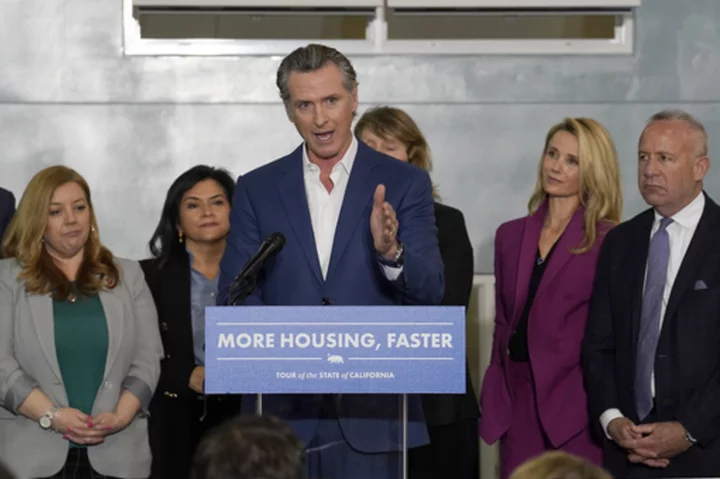SACRAMENTO, Calif. (AP) — Religious institutions and nonprofit colleges in California will be allowed to turn their parking lots and other properties into low-income housing under a new law aimed at combating the ongoing homeless crisis.
The law, signed by Gov. Gavin Newsom Wednesday, rezones land owned by nonprofit colleges and religious institutions, such as churches, mosques, and synagogues, to allow for affordable housing. Starting in 2024, they can bypass most local permitting and environmental review rules that can be costly and lengthy. The law is set to sunset in 2036.
California is home to nearly a third of all homeless people in the U.S. The crisis has sparked a movement among religious institutions, dubbed “yes in God’s backyard,” or “YIGBY,” in cities across the state, with a number of projects already in the works.
But churches and colleges often face big hurdles trying to convert their surplus land and underutilized parking lots into housing because their land is not zoned for residential use.
Proponents said the new law will serve as another tool to help build much-needed housing in the state. A recent study by the University of California, Berkeley, Terner Center for Housing Innovation estimated California religious and higher education campuses have more than 170,000 acres (68,797 hectares) of land that would be eligible under the bill.
Several cities opposed the bill and said it would take away local control over housing developments.
Newsom also signed another high priority housing bill authored by Sen. Scott Wiener to extend the life of a landmark law streamlining rules about housing projects that has led to construction of thousands of homes aimed at easing the state's housing crisis.
"California desperately needs to ramp up housing production, and the Governor’s actions today help put us on a path to achieve that goal,” Wiener said in a statement. “The era of saying no to housing is coming to an end. We’ve been planting seeds for years to get California to a brighter housing future, and today we’re continuing strongly down that path.”
The original law, which took effect in 2018 and is set to expire in 2026, allows housing developers to bypass most local permitting processes for multifamily housing projects in cities falling short of the state-mandated housing goals. The law has helped fast-track more than 19,000 homes, with roughly 60% of them being affordable housing, according to the bill’s author, Democratic Sen. Scott Wiener. The new law would extend the existing rules by 10 years.
The new law would also remove the requirement to hire “skilled and trained workers” for a number of projects, a provision typically sought by the powerful construction trades union. Instead, it requires workers to be paid prevailing wage, which is the average wage paid to workers, laborers and mechanics in a particular area. Facing opposition from labor groups, Wiener added amendments to bolster labor regulations on bigger projects.
The bill had also met fierce opposition from the state Coastal Commission and environmental groups in July because it would remove the exemption on streamlined housing development in coastal zones. Opponents had worried the bill would place housing in areas prone to sea-level rise or wildfires and make way for luxury apartments, not affordable housing, along the coastline.
Wiener worked with the commission to clarify the legislation won’t apply to environmentally sensitive or wildfire-prone areas. The commission withdrew its opposition, but a number of cities in Southern California continued to oppose the bill, arguing it would take away local control.
The governor signed these bills on the same day his administration and Sacramento leaders announced the location of the first group of 1,200 tiny homes he has vowed to build in four cities to address homelessness.









